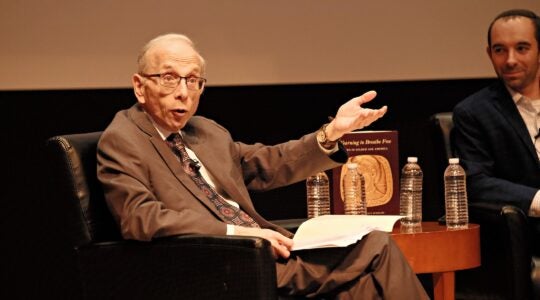NEW YORK – A recent declaration by an assortment of Evangelical Christian leaders reminds us of a great irony of the modern Jewish-Christian encounter.
Our Evangelical Protestant neighbors are often friends of our national identity, as demonstrated by their support for the State of Israel, but are at times less than friendly to our faith identity as Jews. Our Mainline Protestant neighbors are often friends of our faith identity, but at times this friendship does not extend to our national identity.
A full-page ad in the New York Times on March 28 brought this contradiction into full relief. The ad, which comes from an international group of evangelicals, pledges support for efforts specifically aimed at converting Jews.
Up front, it should be stated that while some important evangelicals signed this ad, it is far from a “who’s who” of the conservative Christian world. Absent are leaders of most of the major evangelical churches, organizations, seminaries and publications in America. This does not minimize the affront of the content of the ad, but it does remind us to keep it in its proper perspective.
The ad denies that it is deceptive for Jewish converts to Christianity to identify as Jewish. We disagree.
While there is much that we debate in our wonderfully diverse Jewish community, there is no “wiggle room” on this matter. The leadership of each major stream of Judaism – Conservative, Orthodox, Reconstructionist and Reform – has publicly and unequivocally rejected the “Hebrew Christian” movement’s claim to be a form of Judaism, and have objected to its effort to proselytize and convert Jews. So, too, has the Jewish Council for Public Affairs, an advocacy umbrella group bringing together national Jewish organizations and local Jewish communities.
A resolution adopted by JCPA in 2002 and reaffirmed this year also condemns the use of Jewish symbols and practices as deceptive and inappropriate in the marketing of Christian religious groups as legitimate forms of Judaism.
It is, in my opinion, theologically arrogant to prescribe how another faith community should define itself. We do not tell Christians that they should not share their faith with others. Nor do we tell Christians whom they should consider Christian. Would any of us have the chutzpah to tell Evangelical Christians that they should consider Christian someone who does not recognize the divinity of Jesus?
Our objection is not to evangelizing. Our objection is to misleading and aggressive proselytization. I should think that our common faith traditions would compel both Jews and Evangelical Christians to come to the same objection, namely one should not bear false witness, nor should one do to others that which is hateful to oneself.
It is a standard practice of Hebrew Christians to misappropriate Jewish customs and practices to create a Jewish façade through which to evangelize. Churches bearing Hebrew names, with ministers using the title “Rabbi,” invite Jews to services that may have a familiar resonance. We find that the English name for Jesus is rarely used. Rather, in its place we see the Hebrew “Yeshua.” The English could be off-putting to those they seek deceptively to convert. But Moses, well he’s still Moses. We don’t hear the Hebrew “Moshe.”
And what of the practice of proselytizing children, people in nursing homes, and other vulnerable groups? Would these evangelical leaders welcome a situation where their child was the only Christian in a school and the non-Christian children brought in candy canes proclaiming Jesus was not the messiah, a message reinforced by pamphlets left on that child’s desk, and prayers said in that child’s classroom. Would the same “Golden Rule” apply?
It is not sufficient to say that love for Jews compels deceptive or aggressive efforts aimed at converting Jews. Taken together, these efforts to proselytize are a mockery of Judaism – a curse and not a blessing. Indeed, it is impossible to separate deceptive and aggressive proselytization from the long history of Christian anti-Semitism. Theological rationales and claims of benign intent do little to mitigate the broader implications.
Just as we must raise difficult questions about Israel with our Mainline Protestant friends, so to must we raise difficult questions about proselytizing with our Evangelical Protestant friends. We must monitor the activities of missionary groups aimed at Jews, publicly condemn activities that target Jews, and pay special attention to efforts directed at children and the elderly.
We cannot wait for louder wake up calls to review Jewish organization membership criteria to ensure that we retain a right to exclude individuals who evidence ulterior motives antithetical to the mission of that Jewish organization or institution. And throughout, we need to remember that the strongest defense to attempts to convert us is Jewish education and pride.
This is a “teachable moment.” Let’s make the most of it.
Ethan Felson is the associate executive director of the Jewish Council for Public Affairs.
JTA has documented Jewish history in real-time for over a century. Keep our journalism strong by joining us in supporting independent, award-winning reporting.






